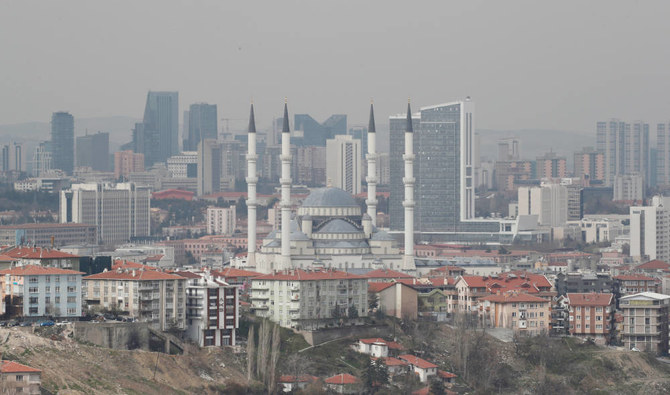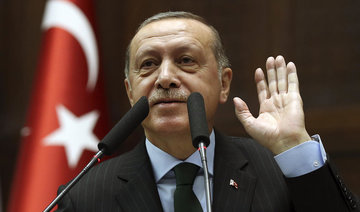ANKARA: A price hike for foreigners seeking citizenship through real estate investment is the latest attempt by the Turkish government to ease the country’s financial woes.
The move is estimated to help Turkey overcome its current account deficit and change the profile of foreign investors.
“Only up to June 3 you can apply for Turkish citizenship by investing $250,000. Obtain a Turkish passport and citizenship in the most prestigious projects in Istanbul,” a popular advertisement reads.
Amid widespread criticism of skyrocketing house prices in the country, which has hit Turkish nationals the most, the government recently raised the amount that foreigners must invest in property in order to become eligible for citizenship.
BACKGROUND
Amid widespread criticism of skyrocketing house prices in the country, which has hit Turkish nationals the most, the government recently raised the amount that foreigners must invest in property in order to become eligible for citizenship.
Accordingly, any foreign national who buys real estate worth at least $400,000 — raised from $250,000 in the previous legislation — can get Turkish citizenship. The money should be deposited to a Turkish bank, and the house should not be sold for three years.
Foreign nationals who fulfill this condition, as well as their spouses and children below 18, automatically receive Turkish passports.
The purchase of housing by foreigners is expected to ease Turkey’s widening current account deficit and support the real estate sector, as well as construction companies.
Turkey’s budget deficit tripled in April compared with the previous year and the fiscal gap reached 50.2 billion liras ($3.23 billion). The country also posted a current account deficit of $5.5 billion.
Foreign nationals who join the private pension system with at least $500,000 or foreign equivalent and stay within the system for three years are also entitled to obtain Turkish citizenship.
Foreign businessmen who provide employment opportunities for 50 people in Turkey or those depositing $500,000 to Turkish banks without withdrawing it for three years can also get Turkish citizenship, according to the amended law.
The legislative change will apply from June 13.
For the moment, Russians, Ukrainians and Gulf nationals are the top clients in the Turkish real estate sector, and are buying up property in southern resort towns and Istanbul.
Russians also established a record number of companies — 64 — in March, quadrupling the figure from the previous month.
The number of houses sold in Turkey to foreign buyers soared 58 percent annually, according to official data. Russians topped the foreign buyers’ list with 1,152 houses. They were followed by Iranians and Iraqis, who bought 905 and 714 houses, respectively.
To facilitate sales, Turkish banks also began opening ruble-based accounts.
From January to April, residential property sales to foreigners increased by 49 percent, reaching 20,791 units.
“As the amount of investments required for citizenship was reduced from $1 million to $250,000 over the last four years, there is an increased demand for acquiring Turkish citizenship. But increasing it to $400,000 will also improve the foreign investors’ profile in Turkey,” said Selen Kolan-Imir, an attorney specializing in citizenship law.
However, experts note that the growing interest in the Turkish real estate market by foreigners risks increasing housing prices to uncontrollable levels.
The depreciation in the Turkish lira has also made Turkey’s real estate market more appealing to foreign investors.
“Rather than asking people to invest in real estate, there is a need to encourage foreigners to generate employment opportunities or open innovative startups to result in long-term advantages for the Turkish economy,” Kolan-Imir told Arab News.
With the increased number of foreign children as a result of Turkish citizenship investments, the country should also provide new educational and social facilities, she added.
“Recently there is a surge of private international schools that are opened for foreign children who are living in Turkey with their families or for those who become a new Turkish citizen.”
Bulut Bagci, president of the World Tourism Forum Institute, said that offering citizenship through investment is common in Europe, and that Turkey is choosing to follow a similar path.
“Compared to the similar cases in Europe, especially in the UK, this amount is still low. However, it will support tourism in Turkey and increase tourism revenues, because people who buy a house will visit the country frequently and go to the touristic destinations,” he told Arab News.
However, last month, some opposition lawmakers submitted a motion to parliament for a temporary ban on property sales to foreigners.
Bagci added that foreign nationals who receive Turkish citizenship should be encouraged to take part in the tourism sector by buying hotels and other facilities.
“Following prolonged conflicts in its neighborhood, Turkey needs tourism revenues to meet its foreign exchange needs. My only concern is that the purchase of houses should not be made open to abuse as it needs to be monitored closely with a strict regulation. I have heard so many cases where people sell their houses after getting citizenship to take benefits from this sector,” he said.
After the government recently revealed a new package to provide cheaper housing loans, President Recep Tayyip Erdogan said that property prices in Turkey should be tightly monitored.



































